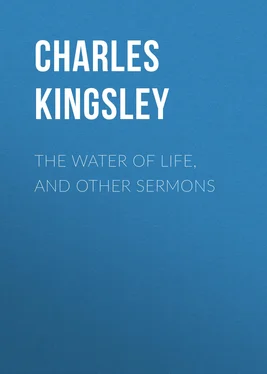Charles Kingsley - The Water of Life, and Other Sermons
Здесь есть возможность читать онлайн «Charles Kingsley - The Water of Life, and Other Sermons» — ознакомительный отрывок электронной книги совершенно бесплатно, а после прочтения отрывка купить полную версию. В некоторых случаях можно слушать аудио, скачать через торрент в формате fb2 и присутствует краткое содержание. Жанр: foreign_prose, foreign_religion, Философия, foreign_psychology, foreign_antique, на английском языке. Описание произведения, (предисловие) а так же отзывы посетителей доступны на портале библиотеки ЛибКат.
- Название:The Water of Life, and Other Sermons
- Автор:
- Жанр:
- Год:неизвестен
- ISBN:нет данных
- Рейтинг книги:4 / 5. Голосов: 1
-
Избранное:Добавить в избранное
- Отзывы:
-
Ваша оценка:
- 80
- 1
- 2
- 3
- 4
- 5
The Water of Life, and Other Sermons: краткое содержание, описание и аннотация
Предлагаем к чтению аннотацию, описание, краткое содержание или предисловие (зависит от того, что написал сам автор книги «The Water of Life, and Other Sermons»). Если вы не нашли необходимую информацию о книге — напишите в комментариях, мы постараемся отыскать её.
The Water of Life, and Other Sermons — читать онлайн ознакомительный отрывок
Ниже представлен текст книги, разбитый по страницам. Система сохранения места последней прочитанной страницы, позволяет с удобством читать онлайн бесплатно книгу «The Water of Life, and Other Sermons», без необходимости каждый раз заново искать на чём Вы остановились. Поставьте закладку, и сможете в любой момент перейти на страницу, на которой закончили чтение.
Интервал:
Закладка:
‘Fly, envious time, till thou run out thy race,
And glut thyself with what thy womb devours,
Which is no more than what is false and vain
And merely mortal dross.
So little is our loss, so little is thy gain.
For when as each bad thing thou hast entombed,
And, last of all, thy greedy self consumed,
Then long eternity shall greet our bliss
With an individual kiss,
And joy shall overtake us as a flood,
When everything that is sincerely good
And perfectly divine,
And truth, and peace, and love shall ever shine
About the supreme throne
Of Him, unto whose happy-making sight alone
When once our heavenly-guided soul shall climb,
Then all this earthly grossness quit,
Attired with stars, we shall for ever sit
Triumphant over death, and chance, and thee, O Time!’
SERMON IV
THE WAGES OF SIN
What fruit had ye then in those things whereof ye are now ashamed? for the end of those things is death. But now being made free from sin, and become servants to God, ye have your fruit unto holiness, and the end everlasting life. For the wages of sin is death; but the gift of God is eternal life through Jesus Christ our Lord.
This is a glorious text, if we will only believe it simply, and take it as it stands.
But if in place of St. Paul’s words we put quite different words of our own, and say—By ‘the wages of sin is death,’ St. Paul means that the punishment of sin is eternal life in torture, then we say something which may be true, but which is not what St. Paul is speaking of here. For wages are not punishment, and death is not eternal life in torture, any more than in happiness.
That, one would think, was clear. It is our duty to take St. Paul’s words, if we really believe them to be inspired, simply as they stand; and if we do not quite understand them, to explain them by St. Paul’s own words about these matters in other parts of his writings.
St. Paul was an inspired Apostle. Let him speak for himself. Surely he knew best what he wished to say, and how to say it.
Now St. Paul’s opinions about death and eternal life are very clear; for he speaks of them often, and at great length.
He considered that the great enemy of God and man, the last enemy Christ would destroy, was death; and that, after death was destroyed, the end would come, when God would be all in all. Then came the question, which has puzzled men in all ages—How death came into the world. St. Paul answers, By sin. He says, as the author of the third chapter of Genesis says, that Adam became subject to death by his fall. By one man, he says, sin entered into the world, and death by sin, and so death passed upon all men, for that all have sinned. And thus, he says, death reigned even over those who had not sinned after the likeness of Adam’s transgression.
That he is speaking of bodily death is clear, because he is always putting it in contrast to the resurrection to life,—not merely to a spiritual resurrection from the death of sin to the life of righteousness; but to the resurrection of the body,—to our Lord’s being raised from the dead, that He might die no more.
Then he speaks of eternal life. He always speaks of it as an actual life, in a spiritual body, into which our mortal bodies are to be changed. Nothing can be clearer from what he says in 1 Cor. xv., that he means an actual rising again of our bodies from bodily death; an actual change in them; an actual life in them for ever.
But he says, again and again,—As sin caused the death of the body, so righteousness is to cause its life.
‘When ye were the servants of sin,’ he says to the Romans, ‘what fruit had ye in those things whereof ye are now ashamed? For the end of those things is death. But now being made free from sin, and become servants to God, ye have your fruit unto holiness, and the end everlasting life. For the wages of sin is death; but the gift of God is eternal life through Jesus Christ our Lord.’
This is St. Paul’s opinion. And we shall do well to believe it, and to learn from it, this day, and all days.
The wages of sin and the end of sin is death. Not the punishment of sin; but something much worse. The wages of sin, and the end of sin.
And how is that worse news? My friends, every sinner knows so well in his heart that it is worse news, more terrible news, for him, that he tries to persuade himself that death is only the arbitrary punishment of his sin; or, quite as often, that the punishment of his sin is not even death, but eternal torment in the next life.
And why? Because, as long as he can believe that death, or hell, are only punishments arbitrarily fixed by God against his sins, he can hope that God will let him off the punishment. Die, he knows he must, because all men die; and so he makes up his mind to that: but being sent to hell after he dies, is so very terrible a punishment, that he cannot believe that God will be so hard on him as that. No; he will get off, and be forgiven at last somehow, for surely God will not condemn him to hell. And so he finds it very convenient and comfortable to believe in hell, just because he does not believe that he is going there, whoever else may be.
But, it is a very terrible, heartrending thought, for a man to find out that what he will receive is not punishment, but wages; not punishment but the end of the very road which he is travelling on. That the wages of sin, and the end of sin, to which it must lead, are death; that every time he sins he is earning those wages, deserving them, meriting them, and therefore receiving them by the just laws of the world of God. That does torment him, that does terrify him, if he will look steadfastly at the broad plain fact—You need not dream of being let off, respited, reprieved, pardoned in any way. The thing cannot be done. It is contrary to the laws of God and of God’s universe. It is as impossible as that fire should not burn, or water run up hill. It is not a question of arbitrary punishment, which may be arbitrarily remitted; but of wages, which you needs must take, weekly, daily, and hourly; and those wages are death: a question of travelling on a certain road, whereon, if you travel it long enough, you must come to the end of it; and the end is death. Your sins are killing you by inches; all day long they are sowing in you the seeds of disease and death. Every sin which you commit with your body shortens your bodily life. Every sin you commit with your mind, every act of stupidity, folly, wilful ignorance, helps to destroy your mind, and leave you dull, silly, devoid of right reason. Every sin you commit with your spirit, each sin of passion and temper, envy and malice, pride and vanity, injustice and cruelty, extravagance and self-indulgence, helps to destroy your spiritual life, and leave you bad, more and more unable to do the right and avoid the wrong, more and more unable to discern right from wrong; and that last is spiritual death, the eternal death of your moral being. There are three parts in you—body, mind, and spirit; and every sin you commit helps to kill one of these three, and, in many cases, to kill all three together.
So, sinner, dream not of escaping punishment at the last. You are being punished now, for you are punishing yourself; and you will continue to be punished for ever, for you will be punishing yourself for ever, as long as you go on doing wrong, and breaking the laws which God has appointed for body, mind and spirit. You can see that a drunkard is killing himself, body and mind, by drink. You see that he knows that, poor wretch, as well as you. He knows that every time he gets drunk he is cutting so much off his life; and yet he cannot help it. He knows that drink is poison, and yet he goes back to his poison.
Читать дальшеИнтервал:
Закладка:
Похожие книги на «The Water of Life, and Other Sermons»
Представляем Вашему вниманию похожие книги на «The Water of Life, and Other Sermons» списком для выбора. Мы отобрали схожую по названию и смыслу литературу в надежде предоставить читателям больше вариантов отыскать новые, интересные, ещё непрочитанные произведения.
Обсуждение, отзывы о книге «The Water of Life, and Other Sermons» и просто собственные мнения читателей. Оставьте ваши комментарии, напишите, что Вы думаете о произведении, его смысле или главных героях. Укажите что конкретно понравилось, а что нет, и почему Вы так считаете.












